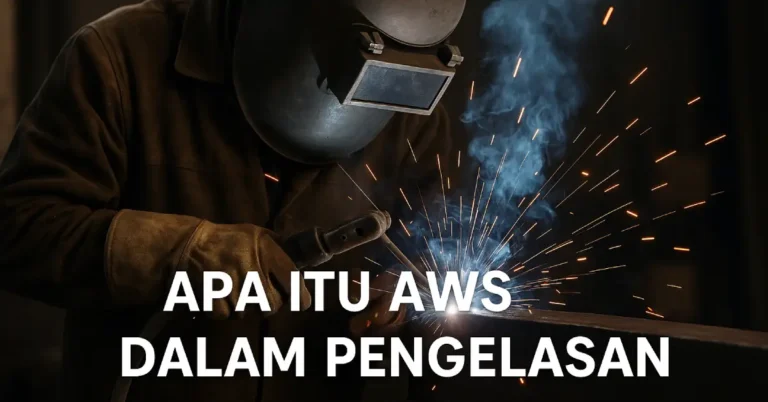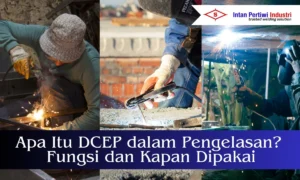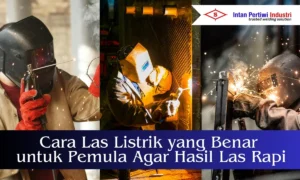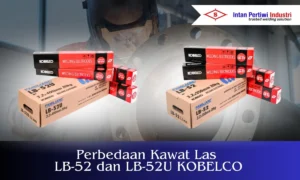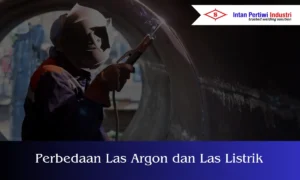In the professional welding world, the term AWS often appears in welding wire codes such as E7016 or E309L-16. However, many new welders and technicians don't fully understand what AWS means and its role in ensuring the quality of their welds.
This article will explain in full about what AWS is in welding, its function, and how this standard is used in the industry and KOBELCO products produced by PT Intan Pertiwi Industri.
Table of Contents
ToggleWhat Is AWS in Welding?
AWS is an abbreviation for American Welding Society, an international institution from the United States that sets standards and classifications for various welding processes and materials.
Established in 1919, AWS serves to ensure that welding wire products, welding procedures, and welded joint results have measurable and globally recognized quality consistency.
In the context of electrodes or welding wires, AWS standards are used to characterize the metal type, tensile strength, welding position, and flux properties.
For example:
E7016
E → Electrodes for SMAW
70 → Tensile strength 70,000 psi
1 → Can be used in all positions
6 → Low hydrogen flux type
With this standard, every welder around the world can understand the characteristics of welding wire just from the AWS code without having to try one by one.
To understand more deeply how to read codes like E7016, you can see the complete explanation in the article Meaning of Electrode Code E7016.
AWS Standard Functions and Benefits
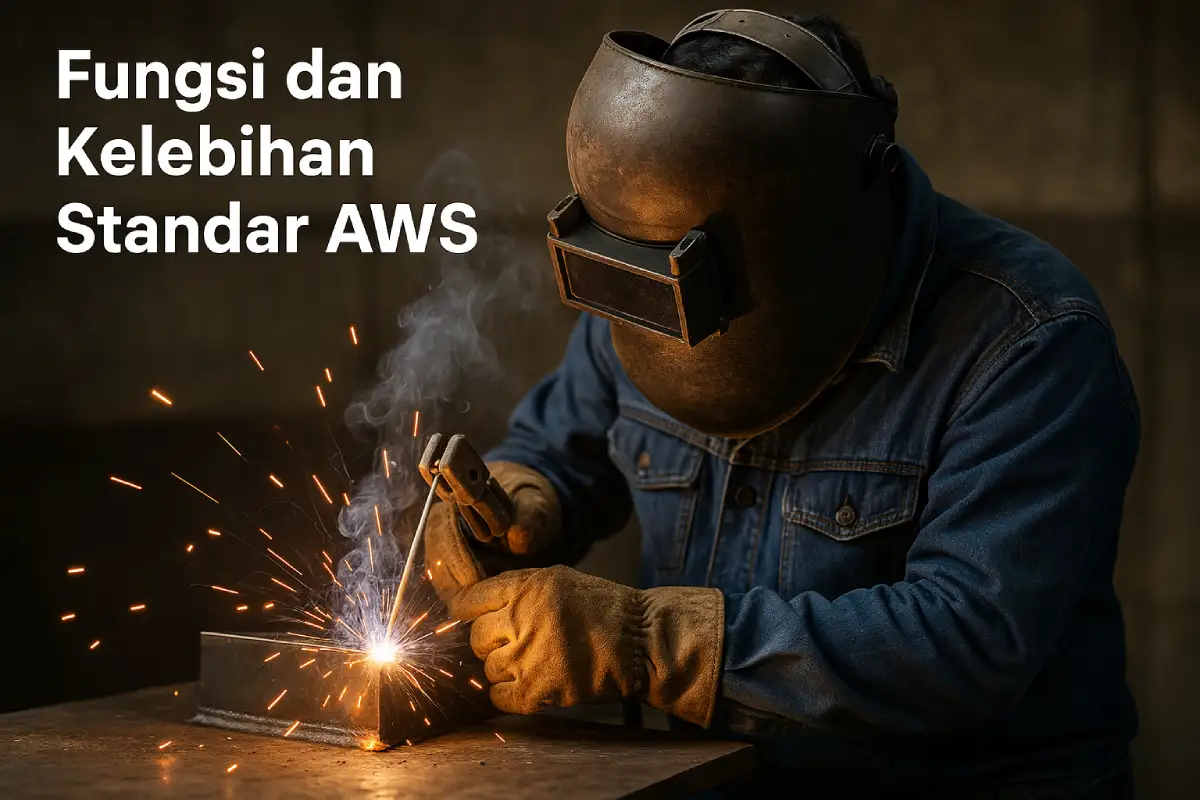
Why is AWS important in welding? Here are its key functions, which form the basis of quality in every industrial project:
Ensuring Quality Consistency
Every AWS compliant electrode has the same mechanical and chemical specifications, even if produced by different manufacturers.
Example: KOBELCO LB-52 (E7016) and other brands with the same code will have similar working parameters.
Make Material Selection Easier
Engineers can determine the appropriate welding wire for the base material, position, and strength required simply by looking at the AWS code.
Supports Audit and Certification
In EPC, oil and gas, or heavy construction projects, AWS is a mandatory reference in the Welding Procedure Specification (WPS) and Procedure Qualification Record (PQR).
Improving Security and Reputation
By following AWS standards, the risk of connection failure can be reduced, while increasing client confidence in the work results.
Based on the experience of the INTIWI team, AWS standard products such as KOBELCO LB-52U (E7016) and RB-26 (E6013) provide stable, clean weld beads with minimal porosity when tested in the internal workshop.
AWS Classification Structure and Examples
The following table provides an example of the interpretation of the AWS A5.1 code for carbon steel electrodes:
| Electrode Code | Meaning of Symbols | Explanation |
|---|---|---|
| E | Electrode | For the SMAW (Shielded Metal Arc Welding) process |
| 70 | Tensile strength 70,000 psi | Shows the strength of the weld metal |
| 1 | All positions | Can be used in flat, horizontal, vertical, overhead positions |
| 6 | Basic flux type (low hydrogen) | Suitable for AC/DC current with fine bead results |
Besides A5.1 (carbon steel), AWS also has other standard series:
A5.4 → Stainless steel electrode (example: E309L-16, E316-16)
A5.5 → Low alloy steel electrode (low alloy)
A5.18 → Solid wire for MIG (G3Si1, ER70S-6)
A5.20 → Flux-cored wire (E71T-1C, E71T-12)
By understanding this series, a welder can immediately know the category of material he is using.
AWS Standard Field Usage Guide
To ensure AWS standards implementation is truly effective, here are some practical tips from the INTIWI technical team's experience:
Read the Complete Code on the Packaging
Each electrode or welding wire package lists the AWS code and production lot number. Ensure it aligns with the project's WPS.
Store Electrodes According to Instructions
Products with the code low hydrogen such as E7016 or E7018 must be stored in a holding oven 100–150°C to prevent moisture absorption.
Use Correct Current and Polarity
Check the AWS datasheet or manufacturer's recommendations (e.g., KOBELCO) to determine the optimal current (AC/DC+ or DC−) and amperage range.
Perform Retesting (Requalification)
If the material or process changes, retest according to AWS D1.1 (for carbon steel) or AWS D1.6 (for stainless steel).
If you are working with mild steel material, also read the guide carbon steel welding electrode so that the selection of consumables remains in accordance with AWS standards and application needs in the field.
For anti-rust applications and special materials, also study stainless steel welding electrode so you can choose a filler that meets AWS standards and the grade of stainless used.
AWS Comparison with Other Standards
| Standard | Origin | Usage Focus | Vital Records |
|---|---|---|---|
| AWS (American Welding Society) | US | Global electrode specifications and welding procedures | Most common in the oil and gas and construction industries |
| JIS (Japanese Industrial Standard) | Japan | Material details and test methods | Widely used in KOBELCO products |
| ISO (International Organization for Standardization) | International | Integration of various standards | Generally used for cross-border projects |
Most KOBELCO products have two standard labels (AWS + JIS) to ensure compatibility across various industrial markets.
After understanding the AWS standards, continue with the guide type of welding electrode based on its code so that you can read the classification of electrodes/welding wires correctly when choosing consumables.
Recommendations & Conclusion
The AWS standards are not just technical codes, they are a universal language that unites welders, engineers, and manufacturers worldwide.
By understanding the meaning of each AWS code, you can choose the right welding wire, avoid usage errors, and maintain the quality of the welding results.
For the PT Intan Pertiwi Industri team, implementing AWS standards is a commitment to the quality, safety, and reliability of every KOBELCO product we distribute.
FAQ – About AWS in Welding
What is the main function of AWS in welding?
To ensure the quality, strength, and safety of welding results according to international standards that can be recognized throughout the world.
Do all welding wires have to be AWS standard?
Not mandatory, but highly recommended. AWS-standard products are easier to certify and are more reliable in industrial projects.
How do I read AWS codes like E7016?
The letters and numbers indicate the electrode function, tensile strength, weld position, and flux type. For example, E7016 = 70,000 psi electrode, all positions, low hydrogen.


